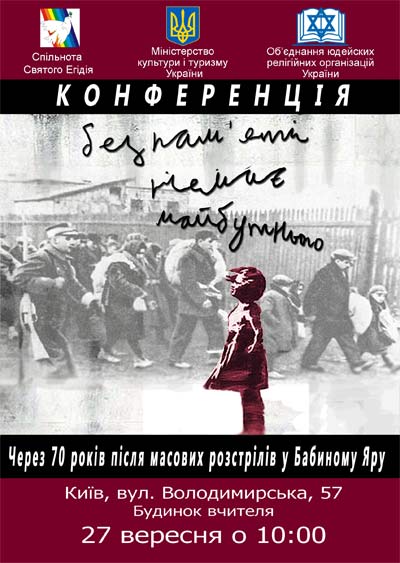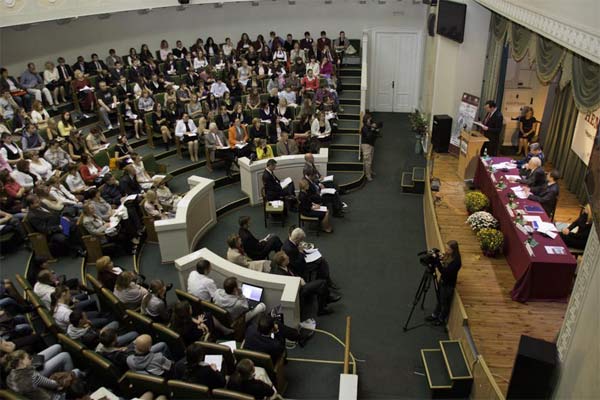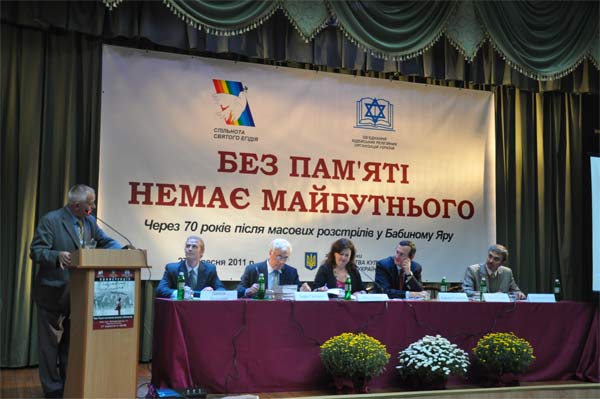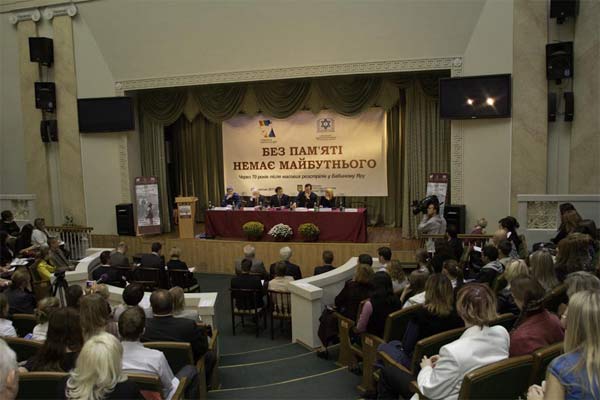 On 27th September in Kiev, in the prestigious Dom Učitelja Hall, where many important events for contemporary Ukrainian history took place, the Community of Sant’Egidio organised a meeting titled “No future without memory. Seventy years after the massacre in Babij Jar”. The Babij Jar bloodshed is a tragic event in the history of Nazi occupied Ukraine and it is recognised as one of the most significant and symbolically relevant facts in the Holocaust’s history. On 27th September in Kiev, in the prestigious Dom Učitelja Hall, where many important events for contemporary Ukrainian history took place, the Community of Sant’Egidio organised a meeting titled “No future without memory. Seventy years after the massacre in Babij Jar”. The Babij Jar bloodshed is a tragic event in the history of Nazi occupied Ukraine and it is recognised as one of the most significant and symbolically relevant facts in the Holocaust’s history.
During the Second World War, on 29-30th September 1941, in the site of Babij Jar in the outskirts of Kiev, Nazi occupation troops killed more than 33.000 Jews: most of them were women, children and old people. In the following weeks and months other massacres of several thousands people – Gipsies, Ukrainians, Russians – were perpetrated in the same area.
The meeting took place in collaboration with the Ukrainian Union of Jewish Religious Organizations, under the patronage of the Ukrainian Ministry of Culture and Tourism. Around 400 participants attended the two sessions: there were diplomatic representatives, politicians, people from the cultural world and civil society associations, but also many young people.
 Indeed, the interested participation of 250 students from Universities and Secondary Schools was a really significant event; In spite of widespread ignorance of young generations regarding the history of the Jewish genocide during the World War 2, many students from Universities and Secondary Schools of the Ukrainian capital city showed a deep interest in the awareness campaign led by the Community of Sant’Egidio before this anniversary. The commitment to disseminate knowledge of the Holocaust among young people is a vital investment to stop racism and anti-Semitism in modern societies. Indeed, the interested participation of 250 students from Universities and Secondary Schools was a really significant event; In spite of widespread ignorance of young generations regarding the history of the Jewish genocide during the World War 2, many students from Universities and Secondary Schools of the Ukrainian capital city showed a deep interest in the awareness campaign led by the Community of Sant’Egidio before this anniversary. The commitment to disseminate knowledge of the Holocaust among young people is a vital investment to stop racism and anti-Semitism in modern societies.
The participants were addressed by the greetings of the President of Ukrainian Parliament, Volodymyr Lytvyn, and of Rabbi David Rosen, Advisor for Interreligious Affairs to the Chief Rabbinate of Israel. Rabbi Rosen wrote: “The Community of Sant’Egidio’s efforts to preserve the memory of Jewish and other Holocaust victims and its work against the development of anti-Semitism and intolerance, produce deep gratitude in the Jewish communities of Italy, Israel and world-wide”.
 During the meeting there were the speeches of institutional and religious authorities, historians, intellectuals and testimonies. The first session was opened with a minute of silence for the victims of Babij Jar and the Holocaust, during the speech of Il’ja Levitas, President of the Jewish Council and the Foundation to preserve the memory of Babij Jar. Also Pietro Giovanni Donnici was present, Italian Ambassador to Ukraine. Then followed the speeches of: Kiev and Ukraine Chief Rabbi Jakob Dov Blaich, Adriano Roccucci from the Community of Sant’Egidio, Viktorija Lisnyča, Deputy Minister of Culture and Tourism, Academician Miroslav Popovič, Director of the Philosophy Institute of the Ukrainian Science Academy, Anatolij Podol’skij, Director of the Ukrainian Centre for the story of the Holocaust. During the meeting there were the speeches of institutional and religious authorities, historians, intellectuals and testimonies. The first session was opened with a minute of silence for the victims of Babij Jar and the Holocaust, during the speech of Il’ja Levitas, President of the Jewish Council and the Foundation to preserve the memory of Babij Jar. Also Pietro Giovanni Donnici was present, Italian Ambassador to Ukraine. Then followed the speeches of: Kiev and Ukraine Chief Rabbi Jakob Dov Blaich, Adriano Roccucci from the Community of Sant’Egidio, Viktorija Lisnyča, Deputy Minister of Culture and Tourism, Academician Miroslav Popovič, Director of the Philosophy Institute of the Ukrainian Science Academy, Anatolij Podol’skij, Director of the Ukrainian Centre for the story of the Holocaust.
The second session started with a short film about the International Meeting in Auschwitz of young people coming from Central and Eastern Europe in September 2010 and promoted by Community of Sant’Egidio; then a University student from the “Friends of the Community of Sant’Egidio“ in Kiev spoke about his commitment to stop the spreading of a culture of despise, anti-Semitism and xenophobia among younger generations.
The speeches of Dmitro Pavličko, a famous Ukrainian poet, Boris Zabarko, President of the Pan-Ukrainian Jewish Organization of former lager and ghetto prisoners, Kostantin Sigov, Director of the Centre for European Humanistic Researches at the “Kievo-Mogilanskaja-Akademija” University, and historian Žanna Kovba concluded the meeting.
 A belief rises from this important meeting: faithful memory of Babij Jar is crucial not only for Kiev and Ukraine, but also for every European person, who is a son or a daughter of that painful and tragic page of history. In front of the numerous expressions of new - and at the same time old - culture of despise, emerging in several European countries, the memory of Babij Jar creates a strong hope that the inhabitants of Kiev, and all Europe with them, will not forget and will not be silent in facing anti-Semitism and any other kind of discrimination. A belief rises from this important meeting: faithful memory of Babij Jar is crucial not only for Kiev and Ukraine, but also for every European person, who is a son or a daughter of that painful and tragic page of history. In front of the numerous expressions of new - and at the same time old - culture of despise, emerging in several European countries, the memory of Babij Jar creates a strong hope that the inhabitants of Kiev, and all Europe with them, will not forget and will not be silent in facing anti-Semitism and any other kind of discrimination.
|

